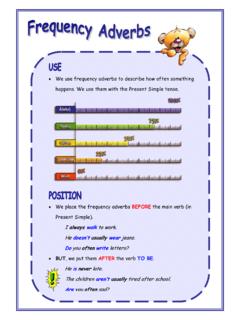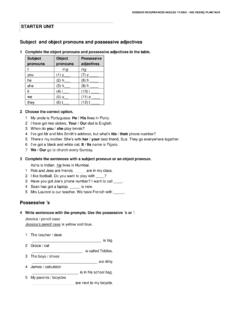Transcription of Adverbs -- Common List in American English
1 Adverbs -- Common List in American English This is a selected set of Adverbs for the beginning student to have a starter set to help further describe actions. An ADVERB modifies a verb. It helps to tell "how," "when" or "where" the action took place. I have used it by picking a verb such as ran in a sentence such as "She ran," "She lost" or "He spoke." Students then must pick an adverb to add to the sentence such as "She ran yesterday" or "She ran quickly to the store" or "She runs annually in the big race." This gives the student a chance to use them in a sentence. An adverb can also modify another adverb. Such as "She ran very quickly to the store." accidentally afterwards almost always angrily annually anxiously awkwardly badly blindly boastfully boldly bravely briefly brightly crossly cruelly daily defiantly deliberately doubtfully easily elegantly enormously enthusiastically equally even eventually exactly faithfully gladly gracefully greedily happily hastily honestly hourly hungrily innocently inquisitively irritably joyously justly kindly lazily nearly neatly nervously never noisily not obediently obnoxiously often only painfully perfectly politely poorly powerfully reluctantly repeatedly rightfully roughly rudely sadly safely seldom selfishly seriously shakily sharply shrilly shyly silently sternly successfully suddenly suspiciously swiftly tenderly tensely thoughtfully tightly
2 Tomorrow too truthfully unexpectedly very victoriously busily calmly carefully carelessly cautiously cheerfully clearly correctly courageously far fast fatally fiercely fondly foolishly fortunately frantically gently less loosely loudly madly merrily monthly more mortally mysteriously promptly punctually quickly quietly rapidly rarely really recklessly regularly sleepily slowly smoothly softly solemnly sometimes soon speedily stealthily violently vivaciously warmly weakly wearily well wildly yearly yesterday Adverbs Definition Adverbs are words that modify a verb (He drove slowly. How did he drive?) an adjective (He drove a very fast car. How fast was his car?) another adverb (She moved quite slowly down the aisle. How slowly did she move?) As we will see, Adverbs often tell when, where, why, or under what conditions something happens or happened.
3 Adverbs frequently end in -ly; however, many words and phrases not ending in -ly serve an adverbial function and an -ly ending is not a guarantee that a word is an adverb. The words lovely, lonely, motherly, friendly, neighborly, for instance, are adjectives: That lovely woman lives in a friendly neighborhood. If a group of words containing a subject and verb acts as an adverb (modifying the verb of a sentence), it is called an Adverb Clause: When this class is over, we're going to the movies. When a group of words not containing a subject and verb acts as an adverb, it is called an adverbial phrase. Prepositional phrases frequently have adverbial functions (telling place and time, modifying the verb): He went to the movies. She works on holidays. They lived in Canada during the war. And Infinitive phrases can act as Adverbs (usually telling why): She hurried to the mainland to see her brother.
4 The senator ran to catch the bus. But there are other kinds of adverbial phrases: He calls his mother as often as possible. Adverbs can modify adjectives, but an adjective cannot modify an adverb. Thus we would say that "the students showed a really wonderful attitude" and that "the students showed a wonderfully casual attitude" and that "my professor is really tall, but not "He ran real fast." Like adjectives, Adverbs can have comparative and superlative forms to show degree. Walk faster if you want to keep up with me. The student who reads fastest will finish first. We often use more and most, less and least to show degree with Adverbs : With sneakers on, she could move more quickly among the patients. The flowers were the most beautifully arranged creations I've ever seen. She worked less confidently after her accident.
5 That was the least skillfully done performance I've seen in years. The as as construction can be used to create Adverbs that express sameness or equality: "He can't run as fast as his sister." A handful of Adverbs have two forms, one that ends in -ly and one that doesn't. In certain cases, the two forms have different meanings: He arrived late. Lately, he couldn't seem to be on time for anything. In most cases, however, the form without the -ly ending should be reserved for casual situations: She certainly drives slow in that old Buick of hers. He did wrong by her. He spoke sharp, quick, and to the point. Adverbs often function as intensifiers, conveying a greater or lesser emphasis to something. Intensifiers are said to have three different functions: they can emphasize, amplify, or downtone. Here are some examples: Emphasizers: o I really don't believe him.
6 O He literally wrecked his mother's car. o She simply ignored me. o They're going to be late, for sure. Amplifiers: o The teacher completely rejected her proposal. o I absolutely refuse to attend any more faculty meetings. o They heartily endorsed the new restaurant. o I so wanted to go with them. o We know this city well. Downtoners: o I kind of like this college. o Joe sort of felt betrayed by his sister. o His mother mildly disapproved his actions. o We can improve on this to some extent. o The boss almost quit after that. o The school was all but ruined by the storm. Adverbs (as well as adjectives) in their various degrees can be accompanied by premodifiers: She runs very fast. We're going to run out of material all the faster This issue is addressed in the section on degrees in adjectives.
7 For this section on intensifiers, we are indebted to A Grammar of Contemporary English by Randolph Quirk, Sidney Greenbaum, Geoffrey Leech, and Jan Svartvik. Longman Group: London. 1978. pages 438 to 457. Examples our own. Using Adverbs in a Numbered List Within the normal flow of text, it's nearly always a bad idea to number items beyond three or four, at the most. Anything beyond that, you're better off with a vertical list that uses numbers (1, 2, 3, etc.). Also, in such a list, don't use Adverbs (with an -ly ending); use instead the uninflected ordinal number (first, second, third, fourth, fifth, etc.). First (not firstly), it's unclear what the adverb is modifying. Second (not secondly), it's unnecessary. Third (not thirdly), after you get beyond "secondly," it starts to sound silly. Adverbs that number in this manner are treated as disjuncts (see below.)
8 Adverbs We Can Do Without--Intensifiers that Don't Intensify Avoid using words such as really, very, quite, extremely, severely when they are not necessary. It is probably enough to say that the salary increase is inadequate. Does saying that it is severely inadequate introduce anything more than a tone of hysteria? These words shouldn't be banished from your vocabulary, but they will be used to best effect when used sparingly. Kinds of Adverbs Adverbs of Manner She moved slowly and spoke quietly. Adverbs of Place She has lived on the island all her life. She still lives there now. Adverbs of frequency She takes the boat to the mainland every day. She often goes by herself. Adverbs of Time She tries to get back before dark. It's starting to get dark now. She finished her tea first. She left early.
9 Adverbs of Purpose She drives her boat slowly to avoid hitting the rocks. She shops in several stores to get the best buys. Positions of Adverbs One of the hallmarks of Adverbs is their ability to move around in a sentence. Adverbs of manner are particularly flexible in this regard. Solemnly the minister addressed her congregation. The minister solemnly addressed her congregation. The minister addressed her congregation solemnly. The following Adverbs of frequency appear in various points in these sentences: Before the main verb: I never get up before nine o'clock. Between the auxiliary verb and the main verb: I have rarely written to my brother without a good reason. Before the verb used to: I always used to see him at his summer home. Indefinite Adverbs of time can appear either before the verb or between the auxiliary and the main verb: He finally showed up for batting practice.
10 She has recently retired. Order of Adverbs There is a basic order in which Adverbs will appear when there is more than one. THE ROYAL ORDER OF Adverbs THE ROYAL ORDER OF Adverbs THE ROYAL ORDER OF Adverbs THE ROYAL ORDER OF Adverbs VerbVerbVerbVerb MannerMannerMannerManner PlacePlacePlacePlace FrequencyFrequencyFrequencyFrequency TimeTimeTimeTime PurposePurposePurposePurpose Beth swims enthusiastically in the pool every morning before dawn to keep in shape. Dad walks impatiently into town every afternoon before supper to get a newspaper. Sonia naps in her room every morning before lunch. In actual practice, of course, it would be highly unusual to have a string of adverbial modifiers beyond two or three (at the most). Because the placement of Adverbs is so flexible, one or two of the modifiers would probably move to the beginning of the sentence: "Every afternoon before supper, Dad impatiently walks into town to get a newspaper.








